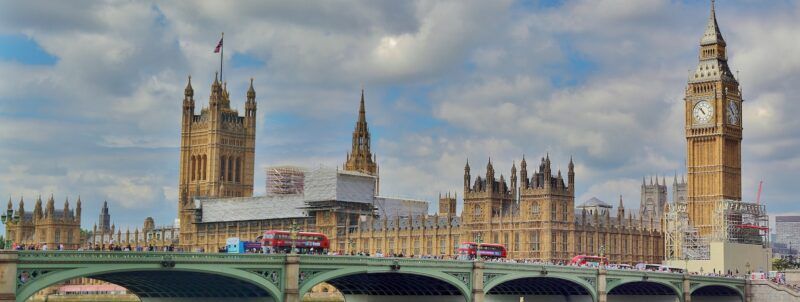Five reasons why the NHS won’t live to see 100
The NHS is 75 years old. What are the chances of it reaching 100? Rich Taunt outlines five risks it faces over the next 25 years and why the answers to them are in an honest conversation rather than a royal commission.
The NHS will die.
Everything does. While it may be our national religion, even religions fade (just ask the Ancient Greeks). The only debate is one of timing and cause. It’s 75 now. What chances of the NHS reaching 100? And if not, what will stop it?
I’ve spent the last 20 years in and around health, in government, regulation, charities, and social business. While every day has involved a fresh (or, more often, not so fresh) debate about the NHS’s wonders and woes, we’re at a point where the NHS’s future feels more fraught than ever. From strikes to trolley waits, it’s no surprise staff and patients alike are finding it harder to keep the faith.
This isn’t a long read about today’s problems. Nor is it an attempt to do the work of the myriad ‘health commissions’ seeking to prescribe a precise cocktail of changes to get the NHS back on track.
Rather it’s a diagnosis of what’s lying in wait over the next 25 years that risks taking it to a point where, no matter the number of reviews from grandees, it can’t come back.
This may include a spot of gloom, but for deeply positive reasons. If we want to see the NHS ideals — the greatest of any health service in the world — flourish, we need to engage seriously and thoughtfully in what threatens them. Embracing the light of healthcare that ‘belongs to the people’ also requires us to linger in the dark as to where it risks going dangerously wrong.
There are five reasons why the NHS may not live until 100: youth, democracy, weather, profit, and truth.
Not what you might expect? That points to a secret sixth: group-think. Debate about the NHS is the equivalent of 7-year-olds playing football: everyone chases the ball. We lurch from ‘big idea’ to ‘big idea’ without pause to wonder whether today’s certainty that yesterday was wrong will be repeated tomorrow. That the answer lies in a different conversation is a theme we’ll come back to.
Youth

‘The ageing population’ is firmly established in the NHS book of doomsday cliches. And with good reason. As our years increase, so do our number of illnesses, and that’s before our use of healthcare rockets in our last months before we die. More older people, more resources spent, more budgets stretched, more money please Chancellor.
But this isn’t the main impact of an ageing population on the NHS at all. For that, you need to look at the other end of the age spectrum and think about who is going to fill the shoes of the NHS’s 1.4 million workers.
An ageing population means proportionally fewer younger workers. While this effect can (and has been until recently) offset by other factors such as education, it’s unlikely to be the case in the coming years.
This shift in the supply of staff is now, and will increasingly impact every part of the economy. While artificial intelligence will render whole swathes of current jobs obsolete, acute skill shortage is something we will all have to get used to. This effect will be magnified for jobs where humanity retains, for now, the upper hand on chatGPT (healthcare: tick), and where demand for people will be going up not down (tick again).
This means healthcare gets it from both ends: fewer people to do the jobs, yet more jobs to fill. Globally, healthcare needs to go on the most almighty recruitment drive: 19 million extra jobs to fill by 2030, a growth of 29% in the time the world’s population will grow by only a third of that.
So what do we know about the people the NHS will be needing to entice? We are in the middle of a revolution as to how the young think about work. Increasingly, the factor that matters most to those seeking paid employment isn’t actually pay.
Surveys have shown that, for those born between 1980–2001, what matters to them above all is whether their employer cares about wellbeing, followed by a leadership that is ethical.
Is the NHS well placed to benefit? In a way, yes: a search for more meaningful work often leads people to healthcare. But go deeper, and the reality of the NHS as a place to work is pretty bleak – 34% of NHS staff currently feel ‘burnt out’ because of work. Barely half say they achieve a good balance between their work and home life, and 45% said they’d felt unwell as a result of work-related stress in the last year.
Remember that the task for the NHS is as much about holding on to the people they have, as finding the new influx. Yet 30% say they often think about leaving, including 17% saying they will leave as soon as they can find another job — a figure reportedly 40% for junior doctors. Already 1 in 7 UK trained doctors are practising overseas, more than any other developed country.
If the NHS can’t find a way to change these numbers, the game’s up. People will choose not to work in healthcare, or if they do, they will find someone else to work for. It’s been clear for a while that younger people today are far less bothered than previous generations about whether they’re treated by an NHS or non-NHS (private sector, social enterprise, or charity) provider, why wouldn’t the same apply to who you’re employed by too?
But we’re yet to reach the worst of it. While appearing a singular beast from the outside, the NHS is actually made up of hundreds of different organisations, all of them deliberately designed to appease ministers ‘above’ rather than people ‘below’. This is problematic because it’s a basic design that is incompatible with the type of culturally sensitive, empowering workplace the NHS will need.
Let’s give a contrast: the Dutch home nursing company Buurtzorg revolutionised their whole healthcare system not just by offering a better way to care for patients, but by providing a better place for staff to work: with coaches not bosses, minimal targets, and a focus on wellbeing and bringing your ‘whole self’ to work. Buurtzorg’s rapid growth from 10 people to 15,000 in little over a decade was fuelled by staff wanting to be part of it: between 2010 and 2016 it won Dutch Employer of the Year five times.
Can the NHS do this? It’s tried. Over the last decade, there has been a raft of ‘Buurtzorg pilots’ from Southwark to Suffolk. They’ve failed in large part because the NHS was simply unable to give staff the autonomy and support required to make it work. If the NHS is going to change it’s going to need to be led by those most often seen to be standing in the way: the politicians.
Democracy
Why do we love the NHS so? And it’s clear we still do: the NHS continues to top the charts as to why Brits are proud to feel British.
Partly it’s about the magic performed by modern medicine. But it’s also tied up with its origins story and what it says about the nation we want to be. Paul Batalden, a healthcare improvement guru, once said ‘every system is perfectly designed to get the results it gets’. We have perfectly designed a system which has national democracy at its core.
This has changed little since the start. The first two words in the 1946 National Health Service Act are ‘Central administration’, going on to state that the Minister for Health must ‘promote the establishment in England and Wales of a comprehensive health service.’
While criticisms of ‘political micromanagement’ are commonplace, to me it’s clear that we’ve never seriously wanted to limit the role of national politicians at all.
In a previous life as a civil servant steering Andrew Lansley’s 2012 Health and Social Care Act through Parliament (we all have our crosses to bear), I sat through dozens of hours of parliamentary debate on relatively minor changes to wording about the role of ministers.
Far more time was spent debating this than any other part of the bill despite it being jam-packed full of things people didn’t like (More competition! Mass structural change!). The end result: clarity that we’ve made our health system bed, and we wanted national politicians well tucked up inside it.
This has been a problem throughout the NHS’s history. But evidence increasingly shows just how unhelpful a role national politicians (and those who support them) have been asked to play in the NHS, making this especially problematic for the next 25 years.
That starts with where we left off: the sort of organisation (or in reality, organisations) we want the NHS to be. As long as ministers can — directly or indirectly — hire and fire NHS leaders from Bristol to Bradford, the rational behaviour of leaders will be to make sure they keep in ministers’ good books and be prepared to do what Whitehall wants.
The chances of an NHS organisation being prepared to do something that benefits their staff wellbeing but be exceedingly unpopular with ministers? Slim to none.
It also speaks to where the NHS expects to find answers to its challenges. A system with ministers in the ‘centre’ is one where all eyes fall upon them for ‘the plan’ to get the NHS out of whatever mess it finds itself in.
While some ‘complicated’ — tricky but ultimately predictable — challenges are shaped well for such a centralised set-up (buying medicines for example), most problems in health aren’t complicated, but complex, involving far too many unknowns for one-size-fits-all processes to work.
That England is arguably the most centralised healthcare system in the developed world is troublesome for a myriad of reasons. It leads to bad decision-making, stymies innovation, and supports a management culture with targets and terror as its go-to tools. It even has the quirk of making NHS numbers lose any meaning. Is £150 billion a ‘good’ budget for the NHS? Is 321,000 the ‘right’ number of nurses?
As Nic Timmins has written, the much quoted ‘bedpan falling in Tredegar reverberating around the Palace of Westminster’ is as likely to have been a cry of despair from Aneurin Bevan as a policy triumph. As healthcare becomes ever more individualised, the best answers will be found as close to the metaphorical bedpan as possible.
There is another way. It is possible to have a politically led system but one which has local, not national, elected politicians exercising democratic control for their area. Currently the NHS approach to this is pure cakeism: a headnod to the importance of local control (such as through regional devolution) without actually reducing the powers of national government one jot.
If we believe there is a better way to involve politicians in the running of the NHS, let’s actually do it (and do it well) rather than engage in an elaborate and rather futile pretence.
The NHS will only be able to successfully navigate its challenges over the next 25 years if its politicians make it easier to do so, rather than constantly having to fight against them. We’re a long way from that now.
Weather
Every generation looks back at what went before with disbelief. Why didn’t anyone twig suitcases needed wheels? Who seriously thought leeches were the cure to all ills? For those looking back on us from 2048, it’s almost certainly going to be climate change.
We know this. We’ve seen everything there is to see. We’re doing something about it. But yet the sheer scale of climate change’s impact will make us look as if we were blithely twiddling our thumbs hoping something might make it all go away.
We already have a decent sense of the health impacts by the turn of the century. Our current ‘hottest summers’ will simply become ‘summers’, bringing a tripling of heat related deaths, increased ambulance call-outs, and higher hospital admissions.
While having your home flooded is unlikely to kill you, you’ll stand a 1 in 3 chance of suffering from PTSD. As well as higher temperatures, we’re likely to be welcoming in new types of mosquito (watch out for diseases such as dengue and Zika) and non-native ticks (Lyme disease is already endemic in the UK).
While these factors will cause additional pressures on the NHS, they’re not going to break it. The NHS is also trying to do its bit, planning to reduce its own greenhouse gas emissions by 80% over the next decade. There’s more which could be done — for example in thinking now about how climate change will affect which clinical specialties will be most needed by 2050 — but this is equally true for how the NHS thinks about long-term change in general.
The far greater risk to the NHS is a budgetary and political one. Over the last 75 years the NHS has gradually gobbled up an increasing share of the government’s cash. At the time of its 50th birthday, the NHS took up 27p of every pound the government spent on day-to-day public services. By its 65th, this had reached 35p. This year it’ll hit 42p and heading only one way.
The government funding for a universal health service over the past 75 years has been a political choice. Currently this choice has resulted in 79% of all healthcare being paid for by the taxpayer. While not an outlier, it is a higher proportion than other countries with admired healthcare systems, Israel, Canada and Germany among them. It’s perfectly possible for this political choice to change, with the most likely option being to move away from a (predominantly) publicly funded system to a more diluted variant.
At this point it’s hard to see any government doing so unless it was forced to; campaigning on an anti-NHS ticket is an electoral death warrant for any party. Which leaves the scenario that the government of the day really would rather not defund the NHS, but external events leave it with little option. This could be war, or economic collapse, or another area of public spending suddenly requiring much higher spending.
But it’s far more likely to be the prospect of flooding, heatwaves and global disruption which is already staring us in the face. Without significant increases in tax, climate change will significantly reduce the ability of any government to continue to fund the NHS to the level it will want to.
Under current policies, the costs of climate change are expected to increase from 1.1% of GDP in 2022 to 3.3% by 2050 (and 7.4% by 2100). If policies change so as to spend more on transitioning to net-zero, this too could cost 2% of GDP, or approximately £40 billion annually.
At the moment, ask any politician what’s the top priority for public spending and you’ll get a resounding chorus of a three-letter acronym. We can think this will continue forever, but it won’t.
Profit

No discussion of threats to the NHS seems complete without a head nod to the spectre of privatisation; the NHS being torn limb from limb by evil (typically dollar-crazed) capitalists.
You’re not going to find that here. This isn’t to say that there’s a good debate to be had about the role of private money within a publicly funded healthcare system. The problem is this isn’t normally a good debate at all. The far greater risk to the NHS is how individuals interact with profit-making companies outside the NHS.
That a world of healthcare needed to exist beyond the NHS’s walls wasn’t in the 1946 plan. Famously, the assumption at the time was that spending on healthcare would likely rise in the short term, but then fall back once the population’s health was ‘fixed’. Not quite right. Seven decades later we’re now more than aware that as a country becomes richer, the more it will spend on healthcare.
This ability to spend more is the real force behind rising healthcare spending. Yes, factors such as an ageing population do mean that there is a need to spend more, but it’s a smaller proportion than technological change and rising expectations.
This makes sense: despite us spending 15 times more on the NHS than at its birth, we still get sick. Age continues to affect what we’re able to do. We still — dare to mention it — die. The upward trend in healthcare spending is likely to stop only when sickness, death, and bears defecating in woods are all dispatched to the history books. This is why ‘more money’ can never be the primary answer to the NHS’s ills; there will never be enough.
It’s not hard to see ways we could be spending vastly more on healthcare now. As David Haslam writes in his brilliant book Side Effects, why is it right that you wait far less time for cancer treatment than for your child to be seen by specialist mental health services? Why does the NHS choose not to fund drugs that would bring significant clinical benefit?
Whether we like it or not, no publicly funded healthcare system anywhere in the world will ever be able to provide everything. The language of a ‘comprehensive’ health service is a cruel lie that will only become more apparent.
Once upon a time the NHS was like the BBC at the birth of television — virtually the only source of healthcare around. Now it’s increasingly living in a world where there are many other services we can easily switch to, the vast majority of these, like television today, being run by for-profit companies.
This is happening right now, and it’s happening fast. It’s seen through the use of technology to measure everything from steps to sleep. About 88% of the UK population are now armed with smartphones, meaning we’ve never been more aware of data relating to our own health.
It’s seen through the rapid rise of those happy to buy one-off treatments out of their own pocket. More than 66,000 such procedures were carried out between July and September 2022, compared to a pre-Covid average of 50,000. Replacements for hips and knees are up by more than 120% compared to 2019. The same is happening with private GP appointments, up with one provider, Spire Healthcare, by 46% in 2022 alone.
While shorter NHS waits (if and when they return) may put a dent in these numbers, the ease for patients to be able to access healthcare services in different ways is here to stay. The impact and risk to the NHS is twofold.
First, is that everyone will expect the NHS to be able to connect beyond its walls. Whether it’s blood pressure on a Fitbit or images from a private scan, the growing expectation will be for the NHS to respond in a way that it is currently wholly unable to do. At present, NHS records barely connect to each other let alone with anyone’s step count.
Second is that — whisper it — the care people experience outside of the NHS might well be better than that they receive within it. Particularly if the NHS becomes increasingly unable to keep hold of its staff, the difference between the quality of the care available in and outside of the NHS might turn into a gulf.
Both effects lead the same way: a questioning of what value the NHS brings, lessening its support. At present the NHS’s trump card is its universalism: its commitment to (at least try) and reach everyone, regardless of situation. But what if services outside of the NHS start to find an answer to that? How the NHS would fare against a major private competitor that went toe-to-toe with it on values is a question that has never been seriously raised — but may well be soon.
Truth

Recent years have seen the publication of a number of reports into failings in care, Mid Staffordshire and Morecambe Bay being just two. Tragically, this isn’t new. Published in 1967, with the NHS barely out of its teens, Barbara Robb’s Sans Everything documented inhumane care in over-crowded, under-staffed wards. Patients had suffered abuse; staff who complained were victimised and accused of disloyalty.
The government duly investigated. Committees were established. A belief that the NHS was the “the best health service in the world” asserted, and the allegations almost entirely dismissed as unreliable and false.
“We have no hesitation in saying,” concluded the committee assigned to look at allegations made at St Lawrence’s Hospital, Bodmin, “that in our unanimous opinion there is no substance whatsoever in the allegations of cruelty by staff to patients as alleged in this article.”
In announcing the government’s response, Kenneth Robinson, the Minister for Health, hoped that “the publication of the White Paper should discourage anyone from making … ill-founded and irresponsible allegations in future.”
Truth is Barbara Robb was far more right than the government ever admitted. The truth is also that the committee’s responses were heavily edited, and with an agenda to dismiss accusations as one-offs or the result of malicious complaints.
As retold by the Health Foundation’s excellent history of health policy, one whistle-blower was described as “a rather solitary person with a somewhat simple mind”.
The NHS does not have a glittering history of dealing well with the truth. While Sans Everything shows one extreme of this spectrum, the past 75 years are strewn with the NHS staring truth in the face, only to look the other way. It’s become perfectly possible — if not actively desirable — for the NHS to say one thing but do quite another.
Appropriately, let’s nip to late-1970s central USSR. The Declaration of Alma-Ata, agreed in 1978 in Kazakhstan’s largest city, is the cornerstone of what has become the ‘Health For All’ approach to health. It describes health and wellbeing as more than just the availability of health services, and calls for efforts in industry, education, and housing just as much as in medicine. It reflects the truth of what determines how healthy we are: only a small minority because of our access to healthcare, far more to do with socioeconomic factors (such as our job), and our behaviours (smoking being top of the list).
The UK has signed up to this. No-one disputes the evidence. We know that choosing to spend money on healthcare services at the expense of stopping ill-health in the first place is likely to be a net loss — certainly in the long-term. We watch as children die in mouldy housing, and life expectancy declines in communities across the country.
The NHS has shown its support by filling policy documents for decades with the same pledges: we will protect public health. We then do the exact opposite. Over the last decade, the NHS budget has risen by more than 20%. Spending on public health services? Down 13%. We know the truth but ignore it.
While we’re in the 1970s, let’s have a quick pop into the weird world of NHS structural change. Since 1980, the NHS has had more major restructures than we’ve had World Cups, with not a single change seriously being able to claim it met all (or even most) of its objectives.
This is a stick the NHS continues to beat itself with; if only there had been an early warning from, say, a well respected health think-tank? Of course there is: “There is a temptation to regard structural change as an achievement in itself,” wrote a Nuffield Trust report in 1971, “which while doubtless causing some dislocation, will start producing benefits immediately without too much bother to many. The truth, alas, lies elsewhere.”
The truth, alas, is that the NHS has commonality with other highly centralised systems heavily incentivised to look up to a set of over-powerful masters. From Putin’s Russia to Musk’s Twitter, organisations that don’t find ways to promote dissent, however hard to hear, tend to make worse decisions.
The emerging science of what makes for good decision-making prioritises diversity of perspectives above all else. When you have an orthodoxy that isn’t seriously interested in whether it’s right or wrong, you run into problems.
It’s easy for us to look at Sans Everything and think times have changed. They have, but the temptation to dismiss absolutely remains. To thrive, the NHS will need to accept that, like healthcare, sometimes the truth must hurt before it can set us free.
The answer
The NHS isn’t doomed. But to avoid the fates set out here requires a change both simple yet requiring exceptional courage.
It’s a change that doesn’t start with a commission, or proclaiming it has the answer all ready to go. Rather, its political masters need to have a conversation that begins by levelling with all of us that, at heart, the NHS has Rolls Royce ideals crudely bolted to a Reliant Robin management structure. It has the aspirations of an iPhone without realising it’s running MS DOS.
This conversation is essential because, without it, how can we talk about the reality of what’s going on and understand the consequences of different options to change (or not)? We need to shatter the group-think that has held sway for far too long, using approaches such as citizens’ juries to learn from and listen to different and diverse views. This works: when global healthcare systems were forced to review what they could afford in the wake of austerity, it was those that had honest conversations with their public that tended to fare best.
It requires exceptional courage because this is a conversation that we’ve never really had. The hardest words for any politician will be to ask, in a non-rhetorical way, do we want the NHS to reach 100? And if so, what gives in order for that to happen?
You can already hear the cat-calls, the accusations of secret conspiracy, Bevan’s famous “the NHS will last as long as there’s folk with faith left to fight for it” quote spray-painted across the country.
Before and following the next election there will be an almighty debate about the future of the NHS. If these most basic of questions are off the table, if we’re not actually getting to the soul of the NHS’s past and future problems, then it’s not going to help. And in doing so, that silence becomes the greatest risk of all.
There is another way. An open, honest debate that acknowledges that large parts of the NHS’s intrinsic character — it’s organisational culture, the role played by its politicians, the presumption it will always top the public spending list, its relationship with the private sector, its attitude to truth — are weak, brings with it the possibility of real, fundamental change.
A health system that is genuinely the best to work for in the world, that is clear what it can do and able to work with others when it can’t, that listens and responds to hard truths from top to bottom. Now that’s worth having the mother of all 100th birthdays for.




Comments